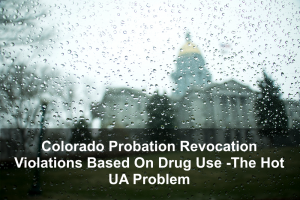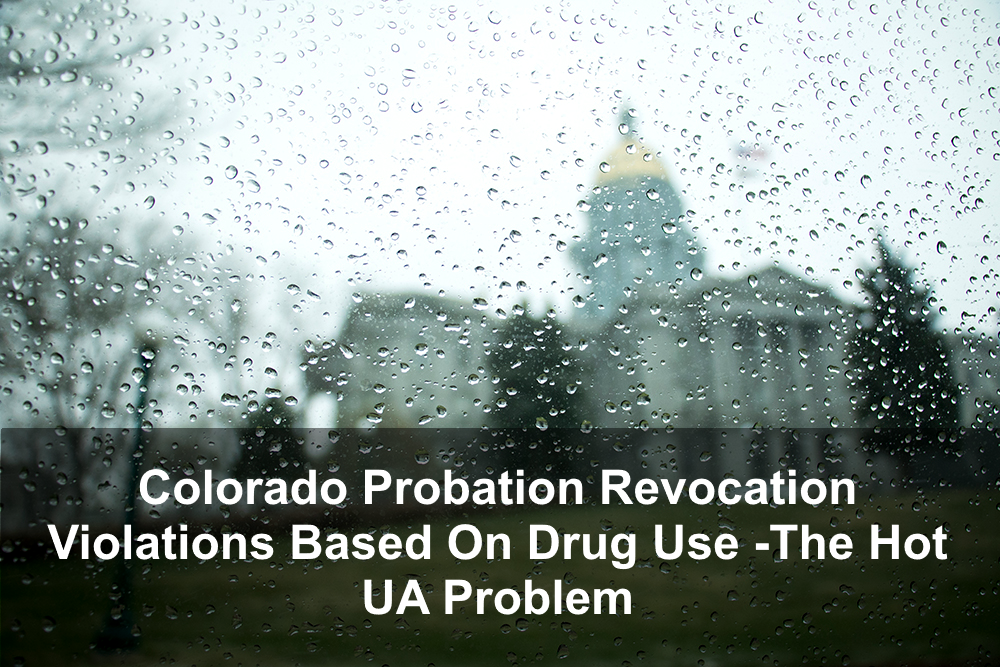




Colorado Probation Revocation Violations Based On Drug Use –The Hot UA Problem
By H. Michael Steinberg Colorado Probation Violation Criminal Defense Lawyer – Attorney
 Colorado Probation Revocation Violations Based On Drug Use – The Hot UA Problem – The number of people on probation in Colorado that have their probation revoked for failing drug tests is astounding. This article advocates for long term patience on the part of the system with individuals who struggle with the use of controlled substances. Mandatory drug treatment has limited effectiveness and requires that probation officers and District Attorney’s provide multiple chances to fight drug addiction and not revoke probation without understanding the underlying issues behind the use of drugs.
Colorado Probation Revocation Violations Based On Drug Use – The Hot UA Problem – The number of people on probation in Colorado that have their probation revoked for failing drug tests is astounding. This article advocates for long term patience on the part of the system with individuals who struggle with the use of controlled substances. Mandatory drug treatment has limited effectiveness and requires that probation officers and District Attorney’s provide multiple chances to fight drug addiction and not revoke probation without understanding the underlying issues behind the use of drugs.
Mandatory drug treatment laws which represent the latest drug control policy, require that low level drug offenders receive substance abuse treatment while on probation rather than be incarcerated. This is an intelligent approach to probation but these policies bring to the table a whole host of new problems.
Low Level Drug Offenses As Colorado Probation Violations
While there have been many studies on the impact of drug prevention programs on drug offenders, there has been minimal attention devoted to how probation departments, Prosecutors, and Judges mentally “process” the problem of low-level drug offenders on probation.
A recent study showed that 60% of offenders sentenced to prison for low-level drug offense were offenders who had their probation sentences revoked.
39% of rule probation violations by probationers are considered “medium” severity technical rule violations based upon behaviors such as absconding, consumption of alcohol, and failure to submit to urine tests. In many of these cases, the use of drugs and consequent probation requirements, such as drug testing and mandatory drug or alcohol treatment, play an important role in probationer’s failure at probation.
Studies indicate that the recent increases in unsuccessful probation completions have a direct link to conditions of probation that increase the likelihood of probation violations such as drug testing. By comparison, only 13% of felony probationers’ revocations are the result of the commission of new crimes.
Understanding The “Relationship” Between Colorado Probation Officers, Prosecutors, and Judges
While most individuals believe that the Prosecutor (DA) wields the most power in the courtroom during a probation violation proceeding, it is actually the probation officer who acts in a “quasi judicial” role in this highly discretionary process of revoking a Defendant’s probation.
While probation officers are dependent on the cooperation of courtroom actors such as the Prosecutor and the Judge, it is clear that Judges almost always follow the Prosecutors’ recommendations and the prosecutor almost always follows the recommendations of the Probation Officer – the person closest to the issues involved in the complaint to revoke probation – who by far the most influential in making the recommendations as to outcomes.
While there may be minimal communication and cooperation that exists between Probation Officers and Judges prior to the probation violation proceeding, when the case is heard in open Court, the Judge will listen always most carefully to the “PO” as to what to do with the Defendant charged with violation of probation.
Many probation officers perceive themselves as “independent professionals” trying to distance themselves from prosecutors and defense attorneys to maintain a careful “legitimacy” within Colorado courtrooms.
The only variable is when a probation violation is based on the alleged commission of a new crime – in which case it is the Prosecutor who most often primarily decides how to proceed.
Categorizing The Severity Of Colorado Probation Violations
Colorado probation violations can be catagorized into essentially three divisions:
1. The most serious violations – such as the commission of a new crime, possession of a weapon, and failure to surrender on a warrant.
2. Medium serious violations such as absconding, using drugs, refusing to complete treatment. and
3. The least serious violations such as missing meetings, not paying court costs, moving without notifying the PO, or not completing a few public service hours out of a larger total.
By far the category of probation violation that is most often violated is having probation revoked for the medium serious violation of testing positive during urinalyses tests and the failure to attend treatment and not the commission of new crimes or the least serious of probation violations of such things as failing to report to probation officer or changing residence without notifying the probation officer of the change.
Mandatory Drug Treatment – Not Revocation Of Probation
Mandatory and consistent drug treatment laws and opportunities for such treatment options such as Drug Court, represent the most persuasive policy options aimed at helping offenders with substance abuse issues. Research demonstrates that the recent increase in drug offenders who fail to comply with treatment plans often suffer from extensive substance abuse problems and that state officials underestimate the seriousness of the drug offenders’ substance abuse addictions.
While drug treatment provides a way for probationers to remain in the community and receive drug treatment, when they are in violation of probation they are perceived by probation officers as not deserving of treatment and the PO’s seek to revoke such cases and recommend incarceration as the appropriate outcome.
Probation violators who fail to comply with treatment-related provisions of probation are often seen as the most deserving of longer sentences given they had the opportunity to receive substance abuse treatment even though, in the opinion of this writer they represent only a minimal threat to the community.
Summary And Conclusion – Colorado Probation Revocation Violations Based On Drug Use –The Hot UA Problem
The dynamics of the process of exactly how Probation Officers, Prosecutors, and Judges conduct their decision-making processes during Colorado probation revocation proceedings is the key to the successful outcome for the Defendant facing possible jail or prison.
Understanding the attitudes and beliefs of why probation officers seek to revoke probation in certain cases comes only after years of experience with these professionals. The attitudes and beliefs of probation officers are based, not only on the individual values of that probation officer, but the policies of the parent organization (the Probation Department) and the social climate that affects the underlying decisions that apply under the specific facts of the case.
Colorado Probation Revocation Violations Based On Drug Use –The Hot UA Problem
If you found any of the information I have provided on this web page article helpful please click my Plus+1 or the Share buttons for Twitter and Facebook below so that others may also find it.
The contents of this article are based upon my research, my personal experience and my personal analysis and opinions developed from my thirty six years (as of 2018) of criminal trial experience from both sides of the courtroom – as a former career prosecutor for Arapahoe and Douglas Counties (13 years) and as the owner of my own Criminal Defense Law Firm since 1999 (19 years).
The reader is also admonished that Colorado criminal law, like criminal law in every state and at the Federal level, changes constantly. The article appearing above was accurate at the time it was drafted but it cannot account for changes occurring after it was uploaded.
If, after reading this article, you have questions about your case and would like to consider retaining our law firm, we invite you to contact us at the Steinberg Colorado Criminal Defense Law Firm – 303-627-7777.
Never stop fighting – never stop believing in yourself and your right to due process of law. You will not be alone in court, H. Michael will be at your side every step of the way – advocating for justice and the best possible result in your case. H. Michael Steinberg is passionate about criminal defense. His extensive knowledge and experience of Colorado Criminal Law gives him the edge you need to properly handle your case
 ABOUT THE AUTHOR: H. Michael Steinberg – Email The Author at:
ABOUT THE AUTHOR: H. Michael Steinberg – Email The Author at:
A Denver Colorado Criminal Defense Lawyer – or call his office at 303-627-7777 during business hours – or call his cell if you cannot wait and need his immediate assistance – please call 720-220-2277.
“A good criminal defense lawyer is someone who devotes themselves to their client’s case from beginning to end, always realizing that this case is the most important thing in that client’s life.”
You should be careful to make a responsible choice in selecting a Colorado Criminal Defense Lawyer. We encourage you to “vet” our firm. Over the last 36 plus years – by focusing ONLY on Colorado criminal law – H. Michael has had the necessary time to commit to the task of constantly updating himself on nearly every area of criminal law, to include Colorado criminal law and procedure and trial and courtroom practice.
Putting more than 36 years of Colorado criminal defense experience to work for you.
H. Michael works hard to get his clients the best possible results in and out of the courtroom. He has written, and continues to write, extensively on Colorado criminal law and he hopes this article helps you in some small way – Colorado Probation Revocation Violations Based On Drug Use –The Hot UA Problem.

Other Articles of Interest:
- Successfully Defending A Colorado Probation Violation Charge
- Colorado Technical Probation Violation Cases
- Colorado Criminal Sentencing Law – How Do I Get A Probation Sentence?
- The Conditions Of Probation In A Colorado Deferred Judgement and Sentence And The Criteria For Granting Probation
- Colorado Probation Violations – Trying To Beat The Urinalyses (UA) – A Losing Proposition In Most Cases












